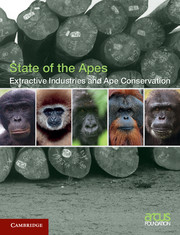Summary
Current dominant thinking and practice in both the private and public sectors continually assert that people's development needs are in conflict with, or mutually exclusive to, the need to conserve the biosphere on which we depend. As a consequence, we are asked to either diminish development in the name of conservation or diminish conservation in the name of development. The efforts to identify complementary objectives, or mutually acceptable trade-offs and compromises, described in this publication indicate, however, that this does not always need to be the case. State of the Apes: Extractive Industries and Ape Conservation, the first in a series, draws attention to the evolving context within which great ape and gibbon habitats are increasingly interfacing with extractive industries.
Commissioned by the Arcus Foundation, the State of the Apes objective is to raise awareness about the status of apes around the world and the impacts of human activities on apes and ape habitat. Apes are closely related to humans and vulnerable to many threats posed to their habitat and their survival, by humans. To understand both the severity and extent of those threats, as well as the possibilities and potential for avoiding and mitigating the threats, the publication brings together leading scholars and practitioners from various sectors, including conservation, industry, and academia.
- Type
- Chapter
- Information
- Extractive Industries and Ape Conservation , pp. 1 - 12Publisher: Cambridge University PressPrint publication year: 2014

